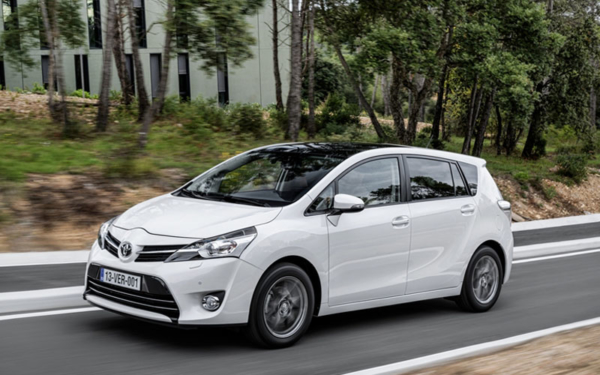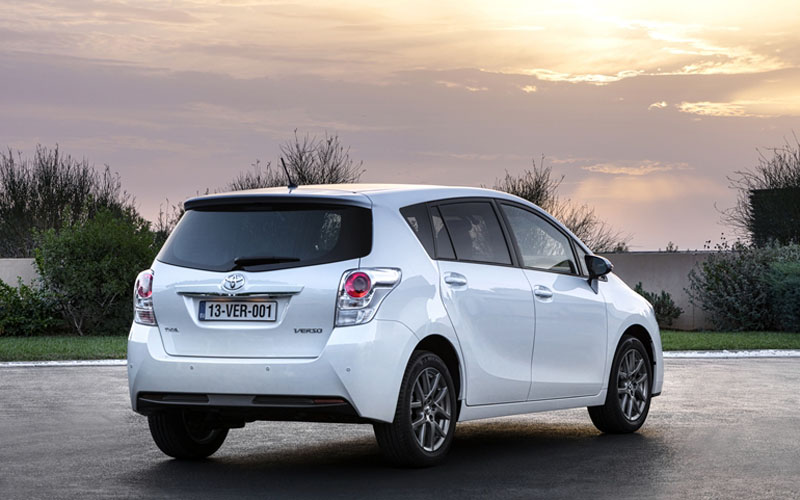
Toyota Verso 2.0 D-4D Icon
What is it?
This is the third generation version of the Verso, Toyota’s rival for the Vauxhall Zafira and Ford C-Max.
The new car is an extensive update of the old model – about halfway between a facelift and a fully-fledged platform change – and gets a crisper, sharper edged look than its predecessor.
Sharper pricing, a keen PCP rate of £199 a month, and 57mpg all look good
The new Verso is the first Toyota to be developed by the company’s European arm, which has a technical facility in Belgium and a design studio in the South of France.
The European team has concentrated in particular on improving noise, vibration and harshness (NVH) and sharpening up the Verso’s chassis dynamics, with impressive results.
Trim levels – in ascending order, Active, Icon and Excel – have been aligned with those of the latest Auris, and almost all Versos sold in the UK are likely to be seven-seater rather than five-seater models. Toyota expects 40 per cent of Versos to go to retail customers, the rest as company cars.

What’s hot?
- Three trim levels are offered – Active, Icon and Excel.
- Active models get air con, front fog lamps and Hill-start Assist Control.
- Icon models get 16-inch alloy wheels, DAB radio, Bluetooth, a rear parking camera and cruise control. The mid-range Icon is expected to account for about 85 per cent of UK sales.
All models are well equipped but you’ll need the mid-range Icon to get DAB, cruise control and business friendly Bluetooth - Excel trim adds features such as larger 17-inch alloys and leather seat bolsters.
- Three engines are available in the UK – a 2.0 diesel and two petrols, a 1.6 (130 bhp) and a 1.8 (145 bhp). The 1.8 is available only in conjunction with Toyota’s Multidrive S automatic transmission; all other Versos are manuals.
- The 2.0 diesel delivers 57.6 mpg and 129g/km, 9 g/km better than in the previous model
- Almost all UK Versos will be seven-seaters as standard. Only the base 1.6-litre petrol Active will be available in five-seat form.
- Sharper pricing than before – Toyota says most Versos will be seven-seaters but sell for a similar price to rival five-seaters. A 2.0 D Icon in the new line-up will cost £555 less than its equivalent in the old range, while a 2.0 D Active will be £165 less than its predecessor. The range starts at £17,495 for a 1.6-litre petrol Active five-seater and rises to £23,445 for an Excel seven-seater with the 2.0-litre diesel. The 2.0 diesel Icon tested here is £21,445
- All Versos get a five year/100,000 mile warranty
- According to CAP, the depreciation performance of the new car is expected to be better than the old, and also better than that of its main rivals.
- PCP deals available from £199 per month
- KWIKcarcost puts company costs for a 2.0 D diesel Icon at 49.67 pence per mile, lower than its main rivals
- Excellent refinement – all that work on NVH and improving the diesel engine has borne fruit
- Improved on-road behaviour thanks to improvements such as the honing of the electric power steering system and a more rigid body shell with more welding points than before.

What’s not?
- In common with most other seven-seaters of this size, space in the third row of seats is fairly limited, and there’s not much luggage space when the third row is in place either. Unlike say, Ford’s Grand C-Max, the seven-seat Verso doesn’t get a roomier body than its five-door counterpart or the convenience of sliding doors.
- Dashboard trim and materials are classier than those found in most recent small and medium-sized Toyotas but the overall effect is still slightly drab – and one or two items such as the interior door handles still feel a bit plasticky.

Business Car Manager verdict
While the new Verso may look like standard Toyota fare, the decision to give the company’s European operation more freedom to show off its capabilities with the development of the new car has paid off, with significant advances in areas such as NVH and driving pleasure.
Toyota is setting itself the conservative target of selling 3,000 Versos a year in the UK, far less than its Ford and Vauxhall rivals achieve, although the company is promising to keep clear of deep discounting and the daily rental market in the interest of keeping those residual values high and business car leasing rates low.
Overall, the new Verso preserves traditional Toyota strengths and practicality but also gives keener drivers quite a bit more than they might expect.
Toyota Verso 2.0 D-4D Icon
The Low Down…
| Doors and body style | 5-door MPV |
| Engine/gearbox | 2-litre 4-cyl turbodiesel/manual |
| CO2 Emissions | 129g/km |
| Economy (combined) | 57.6mpg |
| Power/torque | 127PS/310Nm |
| 0-62mph/top speed | 11.3secs/115mph |
| Insurance group | N/A |
…and what it costs
| P11D Value | £21,390 |
| Monthly business rental (ex VAT) | N/A |
| Road tax (VED) | D |
| Company Car Tax Bands 2012/13 to 2014/15 | 19%, 20%, 21% |
| Benefit in kind 2012/13 to 2014/15 | £4,064, £4,278, £4,493 |
| Annual/Monthly fuel benefit (20%) | £768/£64 |
| Annual/Monthly fuel benefit (40%) | £1535/£128 |
| Annual/monthly company car tax (20%) | £813/£68 |
| Annual/monthly company car tax (40%) | £1,626/£136 |
| Figures correct at time of posting | |
| For latest figures | Use our company car tax calculator |








